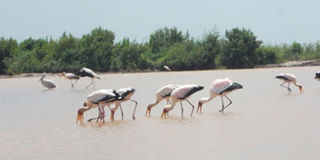How residents can earn while conserving environment

A section of Tana River. FILE | RUPI MANGAT |
What you need to know:
- Mrs Alice Kaudia, representing Environment Principal Secretary Charles Sunkuli, said on Tuesday that the project is in line with the Global Environmental Facility’s (GEF) aspirations which the country emulates through its global partnerships.
- Mr Fred Kihara, a director at The Nature Conservancy, a body which is also involved in the project explained that a portion of the money injected in the fund will be put into an investment account that will earn significant interest to fund future plans.
The government is has started to develop Upper Tana River by introducing a smart new financing system that will see residents earn money and conserve the environment at the same time.
Mrs Alice Kaudia, representing Enviroment Principal Secretary Charles Sunkuli, said on Tuesday that the project is in line with the Global Environmental Facility’s (GEF) aspirations which the country emulates through its global partnerships.
“The project we are launching today is critical to Kenya and our national priorities. It could not have come at a better time than now when Kenya is experiencing serious and prolonged drought,” she said at a meeting comprised of various stakeholders supporting the project.
“It is our expectation that the project will sustainably invest in enhancing ecosystem resilience within the Upper Tana River basin that meets food security, livelihood and economic needs of the people, the private and the public sector,” she said.
Several parts of the country are experienced severe drought forcing the government to step in by distributing relief food and has since spent over Sh180 million.
This year, the National Drought Management Authority and the Meteorological department have warned of impeding drought owing to lack of rainfall in the country.
The upper Tana River project that is being developed, for instance, provides Nairobi city with 95 per cent of its water.
But Nairobi is currently experiencing an acute water shortage with the Nairobi Water and Sewerage Company rationing its supply to city residents.
The project is however not targeting only Nairobi County but other counties surrounding the water belt.
Mr Fred Kihara, a director at The Nature Conservancy, a body which is also involved in the project explained that a portion of the money injected in the fund will be put into an investment account that will earn significant interest to fund future plans.
He said it is estimated that the interest accrued will be about Sh75 million annually, with the principal amount remaining intact.
Farmers living in the river basin will be given cash to conserve their water better, reduce soil erosion that leads to siltation and clogging up of rivers and dams, plant millions tree seedlings and ultimately earn them better income from better harvests.
“Businesses in Nairobi know that they can grow if they rely on water supplies. The growing population in Kenya’s towns and cities know they can survive if they too can be sure of clean water. Yet, up where the water originates, we are facing a huge problem of environmental damage,” the director said.
He pointed out that the project is huge since companies like, NWSC Coca Cola, Pentair Limited, East Africa Breweries limited (EABL) and international conservation agencies have come on board.





